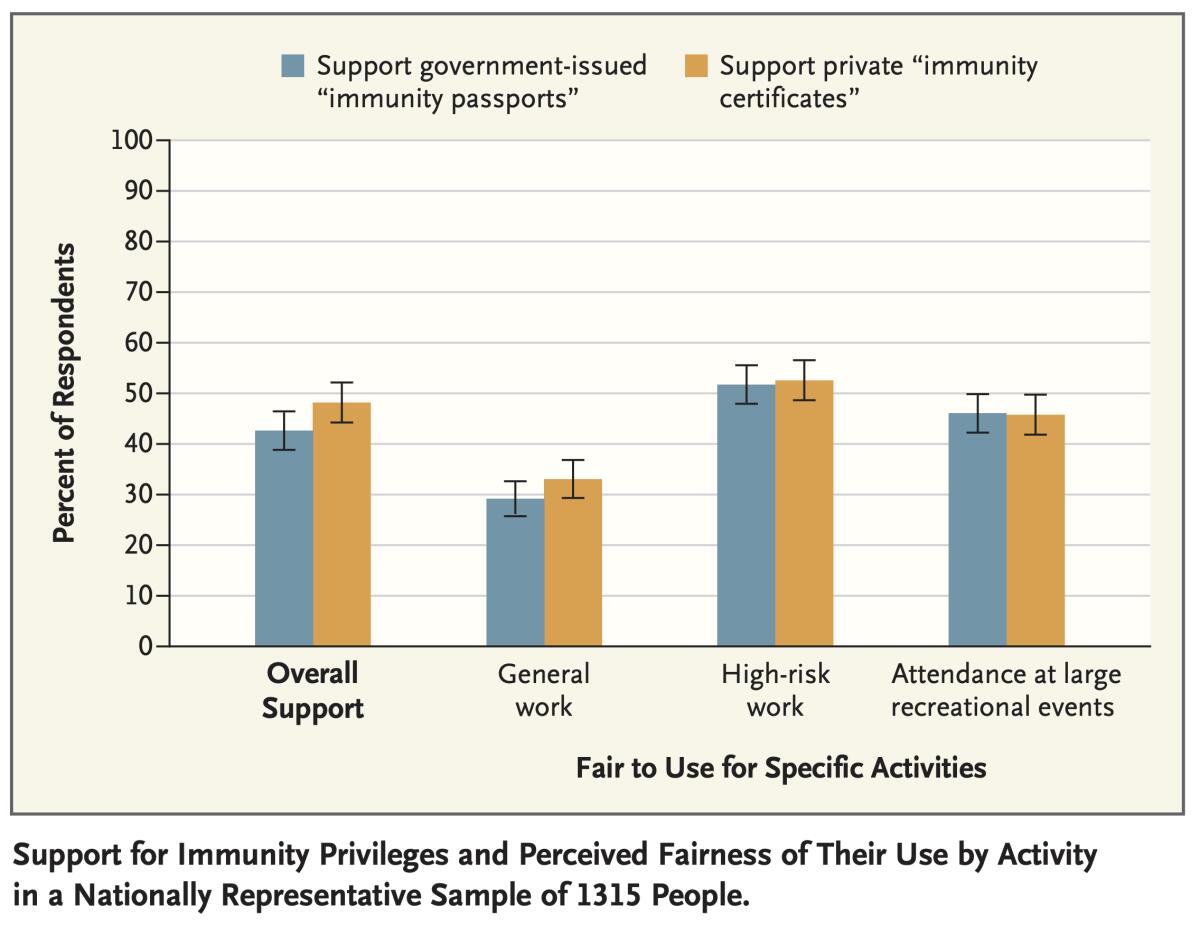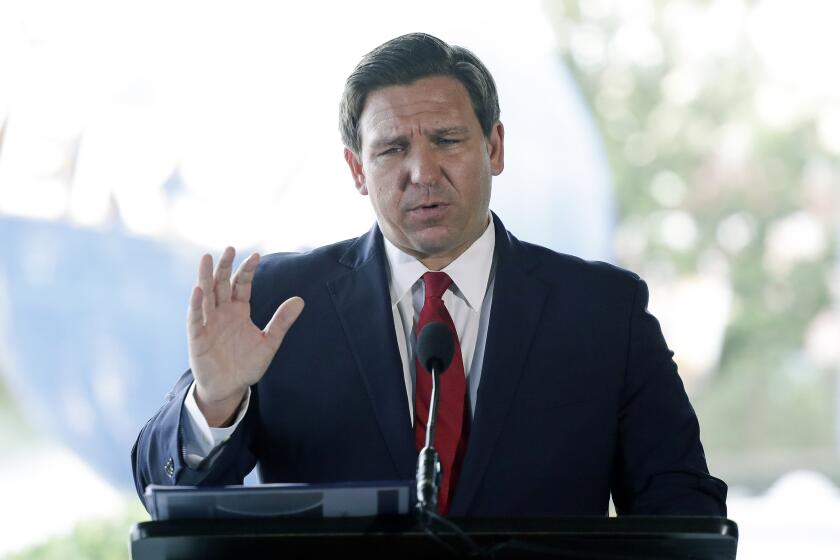Column: Stop grousing about vaccine ‘passports’ — they’re the key to reopening society

- Share via
It was a bright yellow booklet I carried everywhere, and at some national borders it was scrutinized even more carefully than my government-issued passport.
It was my vaccine certificate, showing the dates I’d received shots or screenings for more than half a dozen diseases.
In sub-Saharan Africa, where I traveled as a Times correspondent in the 1980s and 1990s, these included yellow fever, polio, meningitis, hepatitis, measles and tuberculosis.
It’s not until a political party or a faction of a party seizes the issue and makes it politica that suddenly you see people lining up on different sides of the debate.
— David Studdert, Stanford University
All were endemic in many of the countries I covered. Without the vaccine passport — yes, that’s what it was — almost certainly I’d have been barred from leaving the airport and placed on the first plane out of the country.
Immunization rules were rigorously enforced because those diseases were endemic in the countries I visited. Today, COVID-19 is more than endemic; it’s a pandemic, of course. And that’s what makes the political debate over COVID vaccine “passports” so bizarre.
Get the latest from Michael Hiltzik
Commentary on economics and more from a Pulitzer Prize winner.
You may occasionally receive promotional content from the Los Angeles Times.
Make no mistake: In the United States, the debate is being driven almost entirely by ideology and partisan politics. Conservatives and Republicans have embraced opposition to vaccination requirements as the newest flashpoint in their culture war.
In an op-ed published Monday, right-wing Sen. Rand Paul (R-Ky.) called vaccine passports “the newest power grab ... which would determine your social suitability to engage in your everyday life.” He labeled the prospect of a government mandate “full on vaccine fascism.”
Florida Gov. Ron DeSantis, whose desperation to be a frontline culture warrior seems related to his pursuit of the 2024 GOP presidential nomination, on Friday issued an executive order purporting to bar Florida businesses from requiring documentation of COVID vaccination via a “vaccine passport” or other form before admitting or serving patrons.
Whether the order has any teeth is murky. The penalty for businesses in violation is ineligibility for state grants or contracts, and the order says it doesn’t prevent businesses from “instituting COVID-19 screening protocols ... to protect public health.”
Florida Gov. DeSantis is running a victory lap over his COVID-19 response as the press plays along.
In any event, whether any business or state should follow DeSantis’ lead is questionable. Florida currently ranks 12th among all states in its most recent seven-day average of coronavirus cases per capita, and 10th in per-capita deaths. Its rates in both categories are rising.
“I find the politics a little head-spinning,” says David Studdert, a health law expert with a dual appointment at Stanford’s schools of medicine and law.
In a recent article in the New England Journal of Medicine on policy and ethical considerations related to vaccine passports, Studdert and his coauthor acknowledged that requiring proof of vaccination today would be “morally questionable.”
That’s largely because the supply of shots is still inadequate, some age groups are still ineligible, and vaccination rates in low-income and ethnic communities lag those of white and economically privileged Americans.
Those divergences, however, “aren’t going to be there for very long” as the rate of vaccination improves across the board and all adult Americans become eligible, Studdert told me.
Until recently, Studdert says, Americans’ opinions of vaccine-related work or business restrictions appeared to be nonpolitical. In a survey he and his coauthor, Mark A. Hall of Wake Forest University, conducted in June, close to half of all respondents favored privileges for immunized people.
Support was highest for “using passports or certificates to enable returns to high-risk jobs or attendance at large recreational events than for returning to work generally,” the authors found.
What was most interesting was that opinion was completely unrelated to race, age, educational level or partisan leaning. “The split was right down the middle,” Studdert says.
The coronavirus has outsmarted governors who opened their states too early -- almost all of them.
But that may have been because the issue was in a “pre-political” stage at the time — vaccines still seemed to be many months in the future. “It’s not until a political party or a faction of a party seizes the issue and makes it political,” Studdert says, “that suddenly you see people lining up on different sides of the debate.”
For all that conservatives warn that vaccine passports will herald the incursion of government into our private lives, requiring proof of immunization for certain purposes is hardly new.
Families with children are certainly familiar with immunization requirements for school — Florida, like other states, mandates proof of multiple doses of several vaccines before children can enter the K-12 system, for example. Businesses of all kinds reserve the right to deny service to patrons who don’t meet their standards of dress or behavior.
Such rules are generally permitted under law as long as they’re not applied to discriminate against certain protected groups. Federal law prohibits businesses from refusing to serve customers because of their race, religion or national origin, and the Americans With Disabilities Act bars discrimination against the disabled.

Wary of a political reaction, the Biden administration has disavowed any intention to create or maintain a central vaccination database. Its role is more likely to set guidelines and exercise oversight to ensure that the issuance of vaccine proofs isn’t subject to fraud or other wrongdoing.
The impetus for vaccine passports or certifications is more likely to come from the private sector itself. Businesses will want to show that they’re doing their best to maintain healthy premises, in part because many customers will be wary of patronizing those that don’t, whether they’re airlines, retail shops or entertainment venues.
That’s the rationale behind the first state-sponsored vaccine certification, the Excelsior Pass, rolled out by New York state in late March. The app-based pass allows users to upload their vaccine certifications and display a code at the door of participating businesses to gain entry.
Anyone traveling outside the U.S. may be unable to avoid vaccine passports. They’re already in use in Israel and under consideration in Europe. Once the tide of immunization reaches critical mass in the U.S., it’s a safe bet that they’ll be welcomed by the private sector here too. Businesses aren’t going to be very happy about being told by the likes of DeSantis that they can’t take steps to protect their workers and customers.
The lesson of automobile safety mandates is instructive. Detroit automakers resisted federal mandates for shoulder harnesses and air bags for years, arguing that they would drive up car prices and American consumers didn’t care about safety. The rules went into effect in the 1970s, and it wasn’t long before Detroit began using the safety of their vehicles as a selling point.
The conservatives militating against vaccine certifications are making the same calculation — that Americans care less about their own safety than about some nebulous variety of “vaccine fascism.” That’s a bad bet, and businesses and politicians would be well-advised to place their wagers the other way.
More to Read
Get the latest from Michael Hiltzik
Commentary on economics and more from a Pulitzer Prize winner.
You may occasionally receive promotional content from the Los Angeles Times.













